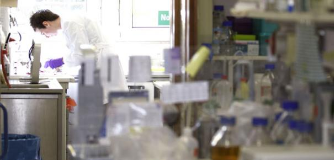Highly sensitive analysis of binding phenomena in real-time without the need for labeling or size limitations
Instruct has 0 centres offering Surface Plasmon Resonance (SPR) across Europe. Navigate the map and click on the pins to discover centres near you.
Surface Plasmon Resonance (SPR) is based on measuring the changes that occur in the refractive index of a metal surface (typically gold) upon binding of different materials, in this case the biomolecules of interest. The changes can be read on real time, and they depend predominantly on the total mass on the surface, thus labeling of the molecules of interest in not required for detection.
The principle assay setup is based on a biosensor on which a first molecule (called the ligand) is immobilized by covalent linking through Cys or Lys ligation, or by any affinity tag (such as antibodies, biotin, GST, His, etc). A second molecule (called the analyte) is injected over the surface with the immobilized ligand and the change of signal due to the binding is monitored in real time (with a time resolution within the second).
Different SPR technologies are implemented for studying interactions between biologic partners. In general (within the idiosyncrasies of different machines) SPR allowes the determination of equilibrium constants (KD – from subnanomolar to hundreds of micromolars), kinetics association (ka) and dissociation (kd) rates, and thermodynamic constants (dH, TdS). SPR can also be used for the determination of sample concentration, the characterization of molecular assembly, epitope mapping and semi-high throughput ligand screening.
SPR can be used with all classes of biological molecules from small ligands (larger than 200 Da), macromolecules (proteins, polysaccharides, lipids and nucleic acids) and large complexes and particles (liposomes, virus).

